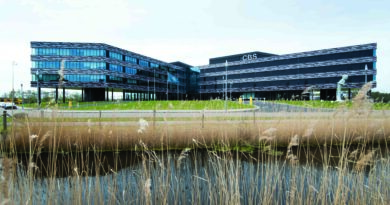PWC: Asking Advisors for Advice
The two employees we are meeting were Lau Akkermans and Gerben den Heijer. Both of them have studied econometrics; Gerben studied in Tilburg, while Lau studied in Rotterdam. Their motivation to study econometrics is also quite alike; they liked mathematics but considered a mathematics study to be too theoretical. Since they liked the idea of applying mathematics in an economic setting they enrolled in the study program econometrics. After completing their bachelor in econometrics both followed a Quantitative Finance master’s program, although in Tilburg Actuarial Science is added to this. As a matter of fact, both guys are still studying. Gerben is now studying to become a certified actuary (in Dutch: AAG), while Lau is studying to receive the Financial Risk Manager (FRM) certification.
Whereas Gerben and Lau are of nearly the same age (26 and 27 years old, respectively), Lau has been working at PwC since September 2011 and Gerben has already worked there for four years. Lau studied for seven years since he deployed a lot of activities besides his study program. For example he has been vice president of the committee of commercial affairs at his student association Laurentius. Besides that he has been a board member of both the student tennis association and of Integrand, an association that mediates between students and companies for internships and business courses. Gerben on the other hand studied for four years. This seems to imply that he was not very active besides his studies, but the opposite is true. For example he has taught several tutorials at Tilburg University, including the econometric first year courses Microeconomics and ICT, and attended most of the activities organized by our study association.A Regular Day
Gerben works in the HRS (Human Resource Services) division and Lau works in the Advisory division of PwC. Gerben works at the PAIS department, which stands for Pensions, Actuarial & Insurance Services. This means that he advises companies about pension matters and specifically advises insurers. Many people at this department are either studying to become a certified actuary, just like Gerben, or are already certified. Although this is the case, Gerben notes that it is not obligatory. However, other colleagues are studying to become Chartered Financial Analyst (CFA) or chartered Financial Risk Manager (FRM), which are relevant choices as well.
According to Gerben it is not possible to describe a regular day since almost every day is different due to the variety in activities and types of work. On some days he works the whole day on the same project but it is also possible to work on several projects a day if they are somewhat smaller. Activities include advising companies on their pension plans and pension strategy, due diligence (mergers and acquisition) activities together with the Financial Services teams related to pensions (for all companies) and insurers as well as consulting to insurers regarding for instance Solvency II, product development and strategic advice. During the week, Gerben spends some days in the office, most of the time in Utrecht and sometimes in Amsterdam, or he is visiting his clients. The variety of what he does every day is actually one of the things he really likes about his current job.
Lau works in the Quantitative Analysis (QA) team, part of the Risk Consulting department. This means he, as the name already implies, is involved in projects to analyze and solve quantitative issues. Amongst others, these projects involve modeling (financial) risks, modeling to support executive decisions, data analysis and process improvement. In line with the PAIS department there are several study options when working in the Quantitative Analysis department. You can also follow courses in programming and follow Lean Six Sigma process improvement training. For Lau there is a lot of variety in his working days as well. It happens quite often he does not know what he will do all day in the morning since tasks will pop up he is not able to predict. For example he will run several simulations and process the outcomes, but he also has to stay in touch with the client.In both the departments there are quite a few econometricians. In the PAIS department they are especially looking for econometricians with an interest in pensions and insurance willing to work in multidisciplinary teams. At the QA department the main focus is on modeling risks, modeling to support executive decisions, data analysis and process improvement. Therefore, QA hires employees with a mathematical background. This means there are, besides econometricians, also mathematicians and even some physicists working there. Lau mentions that being able to think in sets of numbers and other things instead of viewing them individually is something that is really useful. This is also something you definitely learn when studying econometrics. The above illustrates that the study econometrics is very useful on a regular working day at PwC in PAIS or QA and a prerequisite to start a career in one of those teams.
Working at PwC
According to both, PwC has a flat and open structure. Lunch is something you do all together, no matter what function you are in. Next to that, doors are always open, except when in a conference call, so everyone can always walk in and ask a question. Lau mentions that he was positively surprised by how helpful people were when he started working at PwC. A lot of questions he had about how things worked were already answered before he could think to ask them.
We are also interested in why they decided to apply for a job at PwC and whether they had ever considered to start their own company. Gerben has thought briefly about this but not seriously considered it. He concluded quickly there is too much risk involved in the current economy. Besides that, he thought he could still learn a lot by first working at a company like PwC. Lau would actually like it a lot to have his own company and earn his own money. The one prerequisite for him is doing something he is really good at. Taking this into consideration he thinks it might be a good idea for the distant future, since at the moment he can still learn a lot from working at PwC.
Both Gerben and Lau wanted to help and consult companies, in other words to become a distinctive advisor. This is one of the reasons they applied for PwC. They chose to work at PwC because of the broad spectrum of work they are able to do. This turned out to be very nice in practice as well, since Lau and Gerben, whereas they work in different divisions of PwC, have worked together on several projects now, which confirms the multidisciplinary approach of the firm in their assignments.
Theory and Practice
We were also interested in their views on practice and theory. Lau especially likes to develop models for which there is a clear practical application. However, he appreciates the theory behind it. Gerben thinks ‘the strength is in the combination of the two’, while working practical solutions should be your main goal to solve real world client problems, but theoretical knowledge helps to strengthen and broaden your view, and hence the quality of your advice.
As advice for students they told us to look around very carefully and start thinking early about your career opportunities and preferences. Think beyond your possible traineeship as well. According to Lau, econometricians often underestimate all their possibilities. If you apply at a company you should have asked yourself what you want to learn there , how the company will help in your development and why you have chosen to apply, which will also help you in your application procedure.
We would like to thank Gerben and Lau for a wonderful interview and a good impression of working at PwC.
Text by: Ernst Roos




